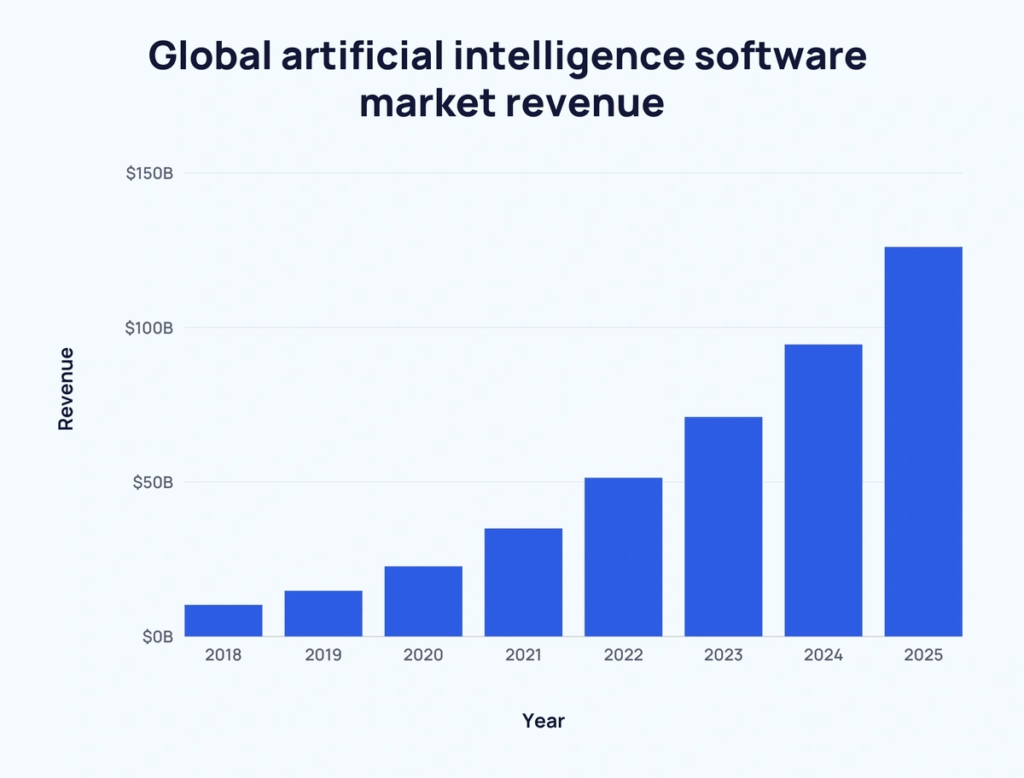TL;DR
AI in software development is redefining productivity. Instead of scaling teams endlessly, businesses now achieve more with smaller, AI-augmented teams. Tools like AI coding assistants, AI assisted coding, and AI productivity tools for developers automate repetitive tasks, speed up testing, and secure deployments. The future of software development with AI means leaner teams, faster releases, stronger security, and greater innovation. CEOs and CTOs who embrace AI driven software engineering today will gain a lasting competitive advantage tomorrow.
For decades, companies believed scaling software meant scaling teams. Add more developers, ship more code. But in 2025, that formula is broken. AI in software development is proving that a small team of highly skilled, AI-augmented developers can outperform massive teams bogged down by coordination overhead and repetitive tasks.
The real competitive advantage no longer lies in headcount; it lies in how well your developers leverage AI tools to amplify their creativity, speed, and problem-solving.
Why Bigger Developer Teams Don’t Guarantee Success
Traditional wisdom suggested hiring dozens (sometimes hundreds) of developers to build and maintain software. But here’s the reality:
- Larger teams mean more communication gaps, duplicate work, and slower decision-making.
- Coordination overhead often erodes productivity.
- Talent costs skyrocket while innovation stagnates.
Instead of scaling teams endlessly, enterprises are now asking: How do we scale impact, not payroll? That’s where AI augmented engineering changes the game.
The Rise of AI in Software Development
The shift to AI-driven engineering isn’t about automating everything; it’s about embedding intelligence at every stage of the development cycle.
Here’s how AI is changing the game:
- Coding Acceleration: With AI coding assistants, developers no longer waste time on boilerplate code. AI assisted coding suggests functions, detects bugs, and optimizes performance in real time.
- Testing & QA: Manual testing is being replaced by AI tools that run predictive tests, simulate user behavior, and ensure compliance across secure SDLC phases.
- Documentation: Developers spend less time writing docs because AI generates and updates documentation automatically.
- Operations: AI driven software engineering enables systems to monitor themselves, predict failures, and self-heal without manual intervention.
This isn’t about replacing developers. It’s about freeing them from repetitive tasks so they can focus on solving real business problems.
From Developers to AI-Augmented Engineers
The developer role is evolving into something new: AI augmented engineering. Instead of being line-by-line coders, developers are becoming strategists, architects, and problem-solvers, with AI taking over execution-heavy tasks.
- Developers use AI productivity tools for developers to speed up debugging, automate testing, and streamline CI/CD pipelines.
- AI for developers acts like a co-pilot, suggesting solutions, highlighting vulnerabilities, and improving code quality.
- With AI assisted coding, engineers spend less time fixing syntax and more time designing scalable architectures.
In this new model, the human engineer doesn’t disappear; they become the conductor of an AI-powered orchestra.
Why This Matters for Business Leaders
For CEOs and CTOs, AI is no longer a technical choice; it’s a strategic one. Here’s why smaller, AI-powered teams create a stronger business case:
- Cost Efficiency: Leaner teams supported by AI software development tools drastically cut hiring, onboarding, and infrastructure costs.
- Speed to Market: AI driven software engineering reduces release cycles from months to weeks, enabling faster pivots.
- Talent Optimization: Instead of hiring dozens of average developers, companies invest in a few AI-augmented rockstars who can deliver exponentially more.
- Innovation Edge: Freed from grunt work, teams can focus on experimentation, product differentiation, and customer-centric innovation.
With the market becoming hyper-competitive everyday, businesses that fail to adopt AI-augmented development risk falling behind faster than ever.
The Future of Software Development with AI
The future of software development with AI won’t be about building massive teams; it will be about building smarter, leaner organizations. Here’s what to expect:
- Hyper-Lean Teams: Enterprises will rely on small, high-performing groups of AI-augmented engineers.
- AI-Integrated Pipelines: The software development life cycle phases will become fully automated, from code generation to deployment.
- Security by Design: AI tools will enforce secure software development life cycle phases, detecting vulnerabilities before code goes live.
- Shifting Roles: Developers will evolve into AI orchestrators, managing workflows across multiple AI coding assistants and productivity platforms.
- Compounded Value: Each release will improve not only the software but also the AI models powering development, leading to exponential efficiency gains.
Simply put, the future of software development with AI is one where smaller teams accomplish more, faster, and at a higher quality than ever possible with traditional methods.

Source : OMDIA
Common Myths About AI in Software Development
Despite its momentum, many myths slow down adoption. Let’s debunk a few:
- Myth 1: AI will replace developers.
Reality: AI for developers is designed to assist, not replace. Engineers remain central to strategy and decision-making. - Myth 2: AI-assisted coding is only for startups.
Reality: Enterprises are already adopting AI software development tools to modernize legacy systems and accelerate innovation. - Myth 3: AI compromises security.
Reality: With secure software development life cycle phases, AI tools proactively identify risks and strengthen compliance. - Myth 4: AI is too expensive.
Reality: The cost of not adopting AI in software development, slower releases, higher labor costs, missed opportunities, is far greater.
How Enterprises Can Transition to AI-Augmented Teams
Adopting AI in software development requires more than buying tools. It’s a cultural and operational shift. Here’s how leaders can make it work:
- Start Small: Pilot AI assisted coding and AI productivity tools for developers on low-risk projects before scaling.
- Upskill Teams: Train developers in AI augmented engineering to maximize tool effectiveness.
- Redesign Workflows: Align the software development cycle with AI-driven automation, especially testing and deployment.
- Prioritize Security: Ensure that AI is embedded into secure SDLC phases.
- Think Strategically: Treat AI adoption as a business transformation, not just a technical upgrade.
A Smarter Way Forward
The old rule, “more developers equals more output”, is dead. The winners of tomorrow will be those who realize that AI in software development empowers smaller teams to deliver smarter, faster, and with greater impact.
At Wildnet Edge, we’re an AI-native company helping enterprises reimagine their development cycles. From AI coding assistants to AI tools, we help organizations build lean, AI-powered teams that unlock the future of software development with AI, today.
Because the future isn’t about bigger teams. It’s about smarter, AI-augmented engineering.
FAQs
1. What is AI software development?
AI in software development refers to using artificial intelligence tools like AI coding assistants and AI productivity tools for developers to automate, accelerate, and optimize tasks across the software development life cycle.
2. How does AI for developers improve productivity?
AI for developers reduces repetitive work like debugging, testing, and documentation. With AI assisted coding and AI software development tools, engineers can focus on high-value tasks like architecture, scalability, and innovation.
3. Will AI replace human developers?
No. AI doesn’t replace developers; it complements them. While AI assisted coding and AI driven software engineering handle repetitive tasks, developers are still essential for system design, critical decision-making, and product vision.
4. What are examples of AI software development tools?
Examples include AI coding assistants, automated testing frameworks, AI productivity tools for developers, and secure SDLC solutions that integrate compliance and bug detection.
5. Is AI assisted coding reliable for enterprise applications?
Yes, when paired with human oversight, AI assisted coding improves accuracy, ensures better code quality, and reduces delivery risks.
6. What is the future of software development with AI?
The future of software development with AI is leaner teams delivering faster and smarter. With AI augmented engineering, 10 developers can now achieve what once required 100.
7. What role do AI coding assistants play in modern projects?
AI coding assistants provide real-time code suggestions, detect errors early, and accelerate the overall development cycle.

Nitin Agarwal is a veteran in custom software development. He is fascinated by how software can turn ideas into real-world solutions. With extensive experience designing scalable and efficient systems, he focuses on creating software that delivers tangible results. Nitin enjoys exploring emerging technologies, taking on challenging projects, and mentoring teams to bring ideas to life. He believes that good software is not just about code; it’s about understanding problems and creating value for users. For him, great software combines thoughtful design, clever engineering, and a clear understanding of the problems it’s meant to solve.
 sales@wildnetedge.com
sales@wildnetedge.com +1 (212) 901 8616
+1 (212) 901 8616 +1 (437) 225-7733
+1 (437) 225-7733















 ChatGPT Development & Enablement
ChatGPT Development & Enablement Hire AI & ChatGPT Experts
Hire AI & ChatGPT Experts ChatGPT Apps by Industry
ChatGPT Apps by Industry ChatGPT Blog
ChatGPT Blog ChatGPT Case study
ChatGPT Case study AI Development Services
AI Development Services Industry AI Solutions
Industry AI Solutions AI Consulting & Research
AI Consulting & Research Automation & Intelligence
Automation & Intelligence















